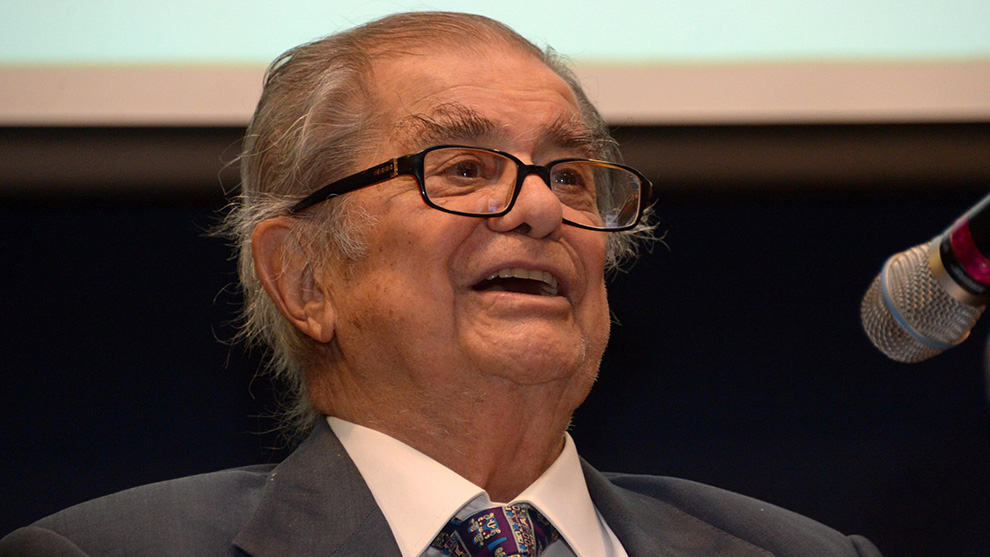His work, beyond UNAM and Mexico: Elisa Speckman
The Facultad de Derecho organized a series of talks about the specialist in Nahuatl culture
By María Guadalupe Lugo García

Miguel León-Portilla is a legend; as a historian and philologist he gave voice to the defeated and created, through his studies on the poetry of languages and indigenous history in general, a new form of literature, stated university academics who participated in the opening ceremony of the series of talks called Within the framework of the Miguel León-Portilla Extraordinary Chair, organized by the Faculty of Law (FD).
During the meeting held at the Benito Juárez Auditorium of the university, the director of the Instituto de Investigaciones Historicas (Institute of Historical Research) , IIH, Elisa Speckman Guerra, highlighted the immense contributions of Miguel León-Portilla to the knowledge of Nahuatl culture and the philosophy of the Mesoamerican past.
She recalled that the Mexican philosopher and historian joined the IIH in 1957 “to found, together with Ángel María Garibay, the Seminar of Nahuatl Culture. He directed this Institute and was part of it for 63 years; not only did he make great contributions to the academic entity, but he became one of the main figures of this University, which earned him the title of emeritus researcher in 1988.”
In the presence of Ascensión Hernández Triviño, Miguel León-Portilla’s wife, she explained that the 30 honorary doctorates that one of the most outstanding scholars of the pre-Hispanic past received throughout his career reflect the links he established with other academic entities of the UNAM and with national and foreign higher education institutions, “it is a recognition of his work that went beyond UNAM and Mexico, and that extended throughout the entire world.”
In this context, she highlighted that this meeting “is an example of the possibility of linking the Faculty of Law with the Institute of Historical Research in memory of our beloved doctor Miguel León-Portilla.”
Brilliant vision
For his part, Domingo Alberto Vital Díaz, an academic at the Instituto de Investigaciones Fililógicas (Institute of Philological Research) and recipient of the Miguel León-Portilla Chair at the Faculty of Law, said that the four words that give the name to Miguel León-Portilla’s work Visión de los vencidos, published in 1959, “are important because until then there was a strong tendency in historiography to use that famous phrase: ‘history is written by the victors’.”
The former coordinator of Humanities pointed out that León-Portilla, “with a vision that I would describe as brilliant, made a paradigm shift from that moment on, giving voice to those people and cultures that had not had a military victory, but who left an important legacy.”
From the 20th century onwards, the specialist in Nahuatl culture and research into pre-Hispanic literature is one of the fundamental figures in the understanding of the so-called vanquished, “who in reality are those who have bequeathed us an important part, a sign of wealth as a country.”
She agreed that León-Portilla is a legend, which has been ratified by international institutions of the highest level, including the United States Congress.
Careerç
The general secretary of the Facultad de Derecho, Sarah Mis Palma León, recalled that Miguel León-Portilla was born on February 22, 1926, and was a doctor in Philosophy with a specialty in History and Pre-Hispanic Thoughts from the UNAM. His doctoral thesis, Nahuatl Philosophy, studied in its sources, was so important at that time that it was translated into Russian, English, German and French, among other languages. As a historian and philologist, he gave voice to the defeated, and through his studies he created a new form of literature.
“Thanks to his interpretation of Mesoamerican thought, it was possible to access that of ancient man and the image he had of the universe and of the future. With this, the conventional interpretations of the ancient Mexicans were overcome and it was shown that their existence, origins and the power of the natural forces that governed them had been questioned, offering enlightening interpretations in relation to the temporal occurrence of the universe and survival,” he continued.
He stressed that another of the diverse contributions of the Mexican philosopher and historian was the study of the semantic potential of the codices, “since he went beyond the simple translation of the documents, by asking himself about the relationship of these books with the different social dynamics.”
Wherever he stopped, he left indelible teachings through his words, since he always considered that history was not a luxury but a necessity. He taught lectures and courses at universities in the United States, Canada, Latin America, Spain, India, Japan and Israel; he was a national emeritus researcher at the SNII and UNAM.
He noted that his academic production includes nearly fifty books, 31 of which have been translated into languages other than Spanish.










